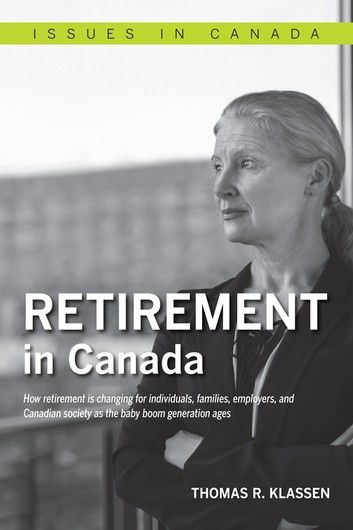| FindBook |
有 1 項符合
Retirement In Canada的圖書 |
 |
Retirement In Canada 作者:Thomas R. Klassen 出版社:Oxford University Press Canada 出版日期:2013-12-02 語言:英文 |
| 圖書館借閱 |
| 國家圖書館 | 全國圖書書目資訊網 | 國立公共資訊圖書館 | 電子書服務平台 | MetaCat 跨館整合查詢 |
| 臺北市立圖書館 | 新北市立圖書館 | 基隆市公共圖書館 | 桃園市立圖書館 | 新竹縣公共圖書館 |
| 苗栗縣立圖書館 | 臺中市立圖書館 | 彰化縣公共圖書館 | 南投縣文化局 | 雲林縣公共圖書館 |
| 嘉義縣圖書館 | 臺南市立圖書館 | 高雄市立圖書館 | 屏東縣公共圖書館 | 宜蘭縣公共圖書館 |
| 花蓮縣文化局 | 臺東縣文化處 |
|
|
圖書介紹 - 資料來源:樂天KOBO 評分:
圖書名稱:Retirement In Canada
A century ago, the average Canadian lifespan was 60; today, we can expect to live 20 years longer than that. And recent generations have witnessed other major social shifts in Canada, from women entering the workforce to alterations in traditional career patterns, from evolutions in the once-inviolable nuclear family to the decline of employer pension schemes. As the arc of our lives continues to change, so too will the experience of our retirement. An important factor in the changing reality of retirement is the influence of the baby boom generation, the demographic group born in the wake of World War II, which comprises some 30 percent of the Canadian population. As this generation has transformed society, challenging gender and ethnic stereotypes and redefining popular culture, so will it transform the choices and challenges associated with retirement. But as Thomas R. Klassen - a professor of political science and public policy and also a well-known media commentator - notes, this generation is not a homogeneous block, and there are few constants in the preferences of those near retirement, as well as those already retired. Unlike the past, the future of retirement holds a wide range of possibilities. This short, accessible book brings together what we know about the changes taking place, as well as what we can predict. The media often foretell of intergenerational conflict and a reduced standard of living as our population ages, but the reality is likely to be different. Klassen considers retirement from many angles. The changing demographic trends in Canada, along with other Western nations, provide fascinating insights into the past, present, and future. Another chapter describes the structure of income security for older Canadians, including its origins in the welfare state as well as its successes and failures. Klassen also looks forward to how retirement pensions will change in coming years. Other chapters look at the debate around mandatory retirement, newer approaches such as phased retirement and "unretirement," as well as new attitudes and expectations.
|











